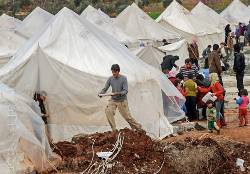Life in overcrowded refugee camps of Lebanon is proving difficult for Palestinians fleeing Syria.
"We are discriminated against here. The Palestinians think we take their jobs and other things. But you see, here, we have nothing.
We don't feel welcome."
The Palestinian refugee from Syria sits in the single small room she occupies with her family, her husband crouched beside a pile of disheveled mattresses.
"But if Assad is still in power then we will not return [to Syria]. He will not stop shooting."
Her husband nods and chain-smokes while their two children smile, seemingly oblivious to the family's dire circumstances.
"I have depression," the husband said, declining to give his name out of fear for their security. "We want deeply to go back to Syria. We have no jobs, nothing here."
The family has been living in Ein el-Helweh Palestinian refugee camp in the southern Lebanese coastal city of Saida for more than a year since fleeing Syria with nothing more than the clothes on their back.
"We lost 11 family members, six of whom were children, in the chemical attack last month," said the woman, who will only give her initials, A.M. "They all died. My daughter was outside when [the shells] hit the building. She is pregnant but escaped. We are so tired of living here."
There is one bed and three filthy, thin mattresses that provide no comfort. Tangled electric wires hang above their heads, but power is rare. They share one bathroom with the rest of the building, and cook on a portable gas stove next to the shared toilet.
Their story is not uncommon and is a shocking reminder of the human impact of Syria's war.
Overpopulated and growing
Ein el-Helweh hosts about 47,500 registered refugees, according to Chris Gunness, spokesman for the United Nations Relief and Works Agency (UNRWA).
Gunness said the camp has become home to about 6,500 of the estimated 45,000 Palestinian refugees from Syria in Lebanon who are facing significant problems.
"They are confronted with limited access to shelter and employment, limited access to local health centers, lack of income and increased cost of living," he said. "The already overpopulated Palestine refugee camps in Lebanon are now feeling the strain on their limited infrastructure."
Yasser Dawoud, executive director of the non-profit organization Development Action Without Borders, echoed his concerns. He said the camp is served only by Palestinian NGOs and there is no UN refugee agency presence.
"An increasing number of Syrian refugees are entering Palestinian refugee camps," he said.
"They do not have access to schools, healthcare, and at the same time, it is very costly for them to go outside the camp. A human being is a human being. The needs are the same for a Syrian refugee and a Palestinian refugee."
With the camp near breaking point, many have been forced to squeeze into existing collective shelters and tents. Each room hosts more than three families and is allocated one toilet, while all 60 families in a shelter share just one shower.
About 50 meters away is a dense community of makeshift tents that barely fit three people each. Mattresses hang with string from the roof, sewage drips down the side of the only toilet - and there is an atmosphere of hopelessness.
Such deplorable living conditions, combined with the lack of employment, are generating tensions between different communities in Ein el-Helweh.
Psychologist Rewida Ismail, who works with particularly vulnerable refugees in the camp, said host communities were also feeling the pinch.
"These people from Syria are coming to a new environment, they are unable to adapt. They have no privacy and they can't be independent," she said.
"Being hosted by other families is making it worse, because these families are already facing stress and pressure."
However, Gunness insists there is no evidence of tension between different groups.
"Some Palestinian refugees from Syria could find jobs with lower wages than Palestinian refugees," he said. "However, no signs of tension can be noticed between the two communities."
Yet some Palestinian refugees from Syria are not convinced.
"There is so much discrimination against us," said a mother of two, who would not give her name for security reasons.
"In the beginning everyone would come and support us. The Palestinians thought we took all the support away from them. All the people started to feel that they didn't like us.
"They think we're taking all their jobs because we might do a job cheaper. Our children are not even integrated with other parts of the community for school."
Gunness points out that UNRWA provides "dedicated" classes for the children of Palestinians from Syria to give them more support.
PHOTO CAPTION
A Syrian refugee camp
Source: Aljazeera.com


 Home
Home Discover Islam
Discover Islam Quran Recitations
Quran Recitations Lectures
Lectures
 Fatwa
Fatwa Articles
Articles Fiqh
Fiqh E-Books
E-Books Boys & Girls
Boys & Girls  Ramadan
Ramadan Fatwa Audios
Fatwa Audios Month of Mercy
Month of Mercy Women
Women Eed Al- Fitr
Eed Al- Fitr Food Recipes
Food Recipes Videos
Videos

 Prayer Times
Prayer Times












